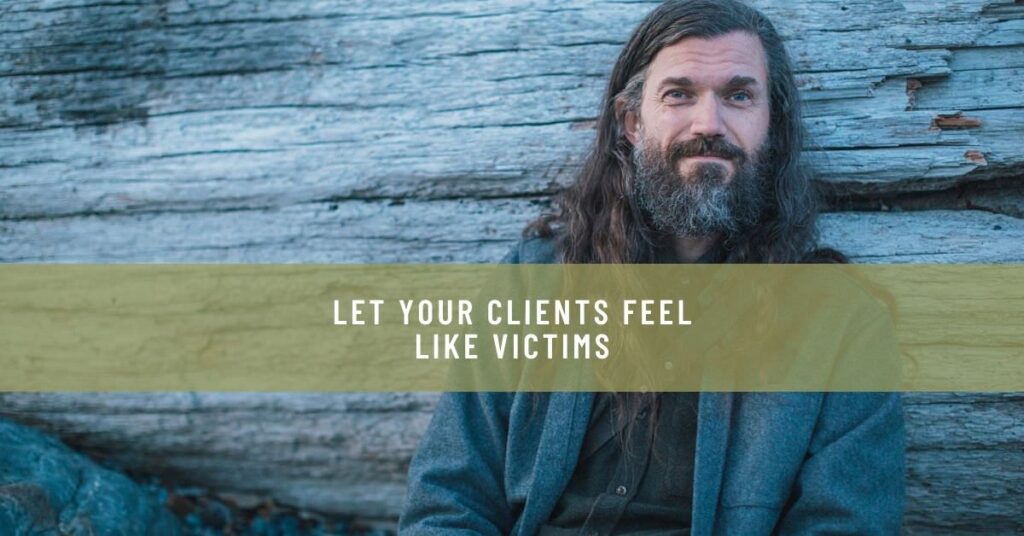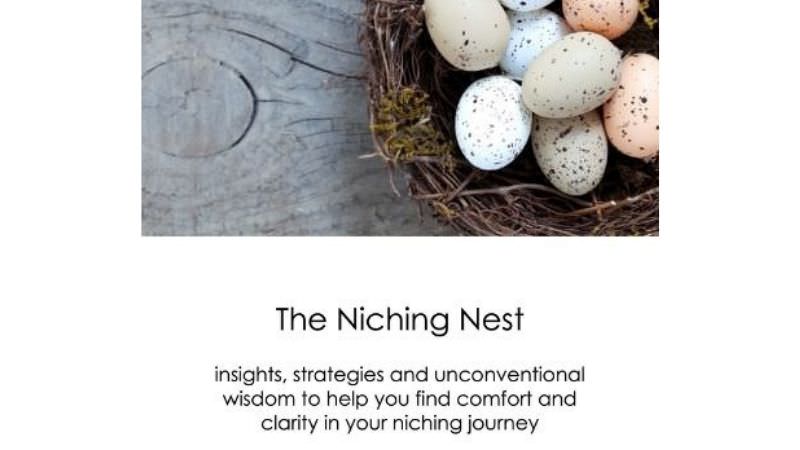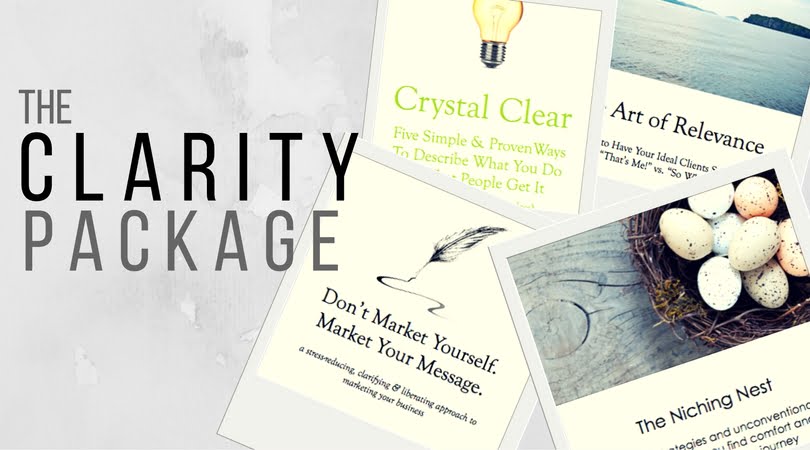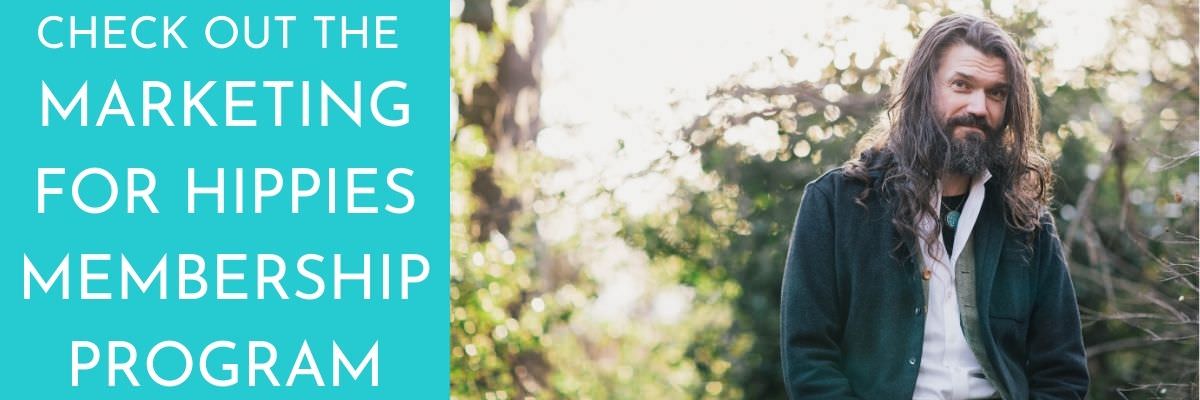Let your clients feel like victims.
It will take your further.
Here’s what I mean . . .
You probably think that it’s better to take responsibility for your life and not be a victim.
You might even secretly feel disgusted by people who ‘play the victim card’ all the time. You might have it in your mind that people who play victim to the world are weak, annoying and huge energy drains. You might be sick of listening to them whine all the time. You might wish your clients would finally just be ready to take responsibility for their lives. Good god.
And I want to suggest that your judgments of them might actually be what’s killing your marketing.
Let’s ignore, for a moment, the irony of feeling like you’re a victim of the constant whining of these other people who play victim. Let’s put aside the doublestandard of saying, ‘my clients victim story is totally getting in the way of my healing them with my awesome healing powers (or insert whatever it is you do that you think their victimhood stops you from doing)!’ It’s amazing how easy it can be to feel like a victim of other people’s victimhood.
When you come from a place of judging their victimhood then you’re going to shame them and make them wrong. And that feels awful to receive.
What if instead of judging the places they feel like a victim you honoured it? What if you could just honour that it is the truth of how they feel.
What if honouring where they are was different from agreeing with them or enabling them? What if, instead of saying, ‘you shouldn’t feel like a victim’ you said, ‘I get it. It can be so hard sometimes. That must feel frustrating. How is it for you?’
I’d even go a step further: don’t wait for them to whine – search for it in advance. Ask yourself, ‘What do my clients feel like they’re a victim of in their life?’ And then, instead of rolling your eyes, could you actually offer them help there – right at that sore and scary place in their life where they feel out of control.
What if their victimhood racket wasn’t in the way of you helping them, what if it was the way?
What if their victimhood wasn’t a wall, but the doorway in?
Imagine someone doing renovations on their home and feeling so overwhelmed and daunted thinking, ‘this isn’t fair! It’s so expensive! I don’t even know where to start!’ and just collapsing emotionally but then they walk into a Home Depot and they see a sign for a class saying, ‘How to Do Your First Home Renovation Under Budget and in Half the Time Your Thought (Even if You Don’t Know Where To Start).’ Can you imagine the relief? Can you imagine how awful it would feel to show your plans to an employee and have them laugh at you and roll their eyes as they mutter, ‘what were you thinking?’
Where do your clients feel like a victim?
Where do they feel like the results they crave are beyond their control?
Maybe they’re a man who’s had no luck with dating and feels like the god’s of love conspire against him and they feel like a victim of their fear which keeps them from approaching women in the first place. Now, you might think, ‘what they really need is to become a stronger man, be more present and more open to life.’ But that’s what YOU think they need. Be kind to them. Help them with the one piece they know they’re struggling with, ‘how to approach a woman’. Sure, there’s more beyond that. But instead of saying, ‘Don’t be shy. God. Grab your balls. What’s wrong with you? Are you a man or a mouse?’
Don’t assume that what’s easy for you is (or should be) easy for others.
Where do your clients feel like a victim?
I think victimhood is our breaking point. It’s where things have officially become too much. It’s beyond our capacity to deal with or make sense of. And telling people that they should be able to deal with it or that ‘everything is perfect’ doesn’t help much. When people feel like victims they’re desperate for help – the last thing they need is someone telling them they should’ve been stronger or more spiritual.
When we feel like a victim we get scared and we begin to image the worst case scenarios (that we might never ever speak to anyone else about).
When we hit this kind of overwhelm there are four things we most need. And judgment and condescension aren’t on the list.
Callan Rush teaches people how to fill their workshops. She knows there are three parts to succeeding as a workshop leader. First, you have to fill your workshops. Second, you’ve got to give a great workshop. And then third, you’ve got to be really good at enrolling people into the next step programs beyond the workshop they’re in. But, instead of trying to convince people of those second two pieces (i.e. the quality of the workshop and effectiveness of the next level offer) her intro workshop focuses squarely on the first piece – the one that they’re thinking about the most – how to get people there. And then, when they’re at the workshop – she also educates them a little bit about the other two pieces. But she focuses on the piece where they feel like a victim first – ‘why doesn’t anyone come to my workshops?!’
Victimhood is a feeling of self pity and ‘poor me’. That can be a turn off. But instead of getting ‘turned off’ . . . sit with it. Really put yourself in their shoes. See if you can feel what it would be like to hit the end of all your rope. And then offer them some help where it hurts most. You’ll connect better, you’ll have a chance to build credibility and you might be shocked how much business it gets you.
And here’s a powerful thing you can affirm that will have people love you: it’s not your fault.
I think everyone is doing the best we can with what we have. And sometimes we lack the skills, perspective, the support etc. to get the things we want. We do our best but we all have our breaking points. And if you can affirm that, ‘yes, you’re responsible for getting what you want but . . . it’s not your fault that you don’t know how or got miseducated’ it feels really wonderful.
Can you imagine what an unmitigated douchebag I would be if I went around to everyone and looked at their marketing and pointed out every place it was contrived, pushy or manipulative? Do you get how arrogant it would be for me to stand up on high and imagine myself to be looking down on everyone who’s not as authentic as me and condescend to them with words like, ‘How can you not get this? What’s wrong with you? Why would you ever think about marketing to anyone like that? Gross.’
There’s a notion called ‘pulling rank’ and it happens all over the place. Have you ever left a conversation feeling ‘smaller’ somehow? Diminished? If you have there’s a good chance that the other person was pulling rank on you. They were subtly condescending to you. They were imagining themselves to be wiser and better than you. Hipsters do it (e.g. ‘Oh you’ve not heard of that band?’) and new age people sure do it, (e.g. asking you ‘What are you learning from this?’ when you’ve not even asked for any coaching). It happens all over the place.
Pulling rank is a lot of things but there’s one thing it’s not: empathic.
If you judge where your clients are at you begin to develop the four most unattractive and client repelling traits. You begin to be a practitioner of ‘shame on you’ marketing.
Contrast that vibe with this approach: ‘I get it. Marketing can be hard. No one taught us how to do this and most of what we’ve learned is manipulative in some way. And so here you are this good hearted person wanting to engage in right livelihood but feeling scared to even do any marketing in case it comes across as manipulative but . . . you still need to eat! You need to pay the rent. So you have to sell. And you don’t always feel good about how you do it. I get it! That is hard.’
Consider which person you’d be more open to.
Life can be hard sometimes. Consider the lyrics of the song, ‘Lean on Me’. It’s okay to be someone that folks can lean on sometimes while we help them stand up on their own.
Empathy before education.
Where do your clients feel like a victim?
It might just be the doorway in.
———————————————————————————————————————————————————
Want Help? If you’d like some more direct guidance and hand holding on figuring out your niche then go and check out my Niching for Hippies coaching program https://marketingforhippies.com/niching-for-hippies/



